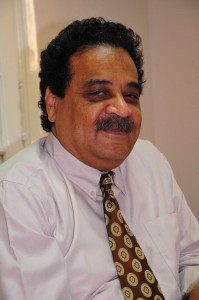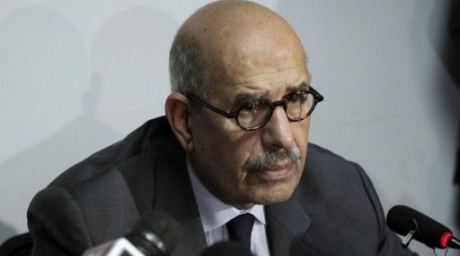
I would have liked to answer the question: “where is Egypt going after 30 June?” but I discovered that I have to first explain what happened on 30 June. We have to put aside what is being said about a military coup, since facts confirm the size of public participation on 30 June. The second wave of the revolution has surpassed the first one, and in both the people would not have gotten their way if the army had not sided with their will. The army’s neutrality would have broken the people’s will or at least disrupted its execution for some time or created more substantial disturbances, causing material and human loses more than what have happened in reality.
The first wave of the revolution was closer to the collaboration of three movements: the state apparatus that refuses the Gamal Mubarak succession scenario, the Islamist political movement and the democratic movement. The Muslim Brotherhood was the most organised and capable of leadership in the Islamist political movement. In addition, the democratic movement was the one most capable of affecting the general mood to the extent that its goals matched that of the protesters, so that it seems like a revolution that truly aspired to democracy. It seemed like the revolution was being led by a visionary movement with clear goals and great organisation ability, but that was unfortunately not true. Finally, the army was at the heart of the state apparatus that rejected the succession scenario and all that involved of excessive weakness and corruption which affected the country for the first time.
The army was part of the operation to overthrow Mubarak, who remained until the last moment supported by other state apparatus and powers. If it wasn’t for the army’s removal of some leaders of these apparatus, the conflict would have persisted.
The three powers continued to play major roles in the second wave of the revolution, but they took up different ones, the democratic powers teamed with the supporters of a hegemonic state to remove the Brotherhood from power. We believed that the first wave was an alliance of the state, Islamist political movement and the democratic movement against Mubarak’s gang. However, in the second wave, the state apparatus combined their efforts with the democratic movement to overthrow the Brotherhood. What happened in the first wave was repeated during the second wave since the political powers wanting to affect change helped in rallying the public against the ruling power’s mistakes. In addition, the army played a critical role in hurrying to achieve the will of the people with the least possible losses.
The first time, the powers rejecting succession believed that the revolution would end with the removal of Mubarak’s regime, and that the hegemonic state would rebuild itself, using the Nasserite model or that of Al-Sadat or Mubarak. However, they were surprised to find out that those who participated in the revolution tried to move forward with it, and affect change beyond overthrowing of Mubarak’s gang. The democratic movement pushed for its project: creating a modern, secular, democratic state. Conversely, the Islamist political movement rallied all its forces, including the Salafis, who outlawed the participation in the revolution, to push towards achieving its own project, establishing a religious state.
In Omar Suleiman’s speech announcing Mubarak’s resignation, he mentioned that the ex-president gave up power to the Supreme Council of the Armed Forces (SCAF), which spearheaded the political scene and started to manage the country in what it saw as a path to restoring it to its pre-Mubarak state. Remarkably, no one at the time called it a military coup even though the army was in fact running the country. Seeing that and the alliance between the army and the Brotherhood, the democratic powers, in just a few months after overthrowing Mubarak, started to chant “down with military rule”, but that did not push the international opinion to dub what happened in Egypt as a coup.
In the transitional period, SCAF, in its plan to rebuild the state, tried to contain other powers with the intention of exclusion. Meanwhile, the Islamist political movement managed to create agreements with the army, and most probably, this was done with the support, or pressure, of Washington. Therefore, the more organised and popular Brotherhood was capable of usurping power after succeeding in attaining, with the rest of the Islamist political powers, the majority of the parliament. Then they formed the government and took steady steps towards the Brotherhoodisation of the state. Meanwhile, the supporters of a hegemonic state were away from the political scene.
The question is: Did the army inform some politicians that it was willing to overthrow the Brotherhood if politicians were able to prompt millions of Egyptians to go down the streets demanding that? I believe that whether the army did that or not is irrelevant because neither the army nor the politicians have the power to rally millions of people. In any way, the army cannot face off with the people in the street whether it likes it or not since it cannot shoot peacefully-protesting civilians. At the end, the army has to yield to the people’s will, since it can only temporarily halt it, causing a lot of chaos, but it cannot affect it.
The only thing of which we are certain is that several politicians called for the army’s intervention during the past months. In this case, the army’s response is that if the people move, they will side with their will, which is a logical response. The calls to the army, or what the politicians called “the heart of the hegemonic state” is an old tradition based on the notion that the army can rebuild the state if it suffered rifts. This notion is rooted in Egyptian history and Anwar Abdel Malek’s theory that the army in a third world country is viewed as the largest and most modern institution, capable of restoring the state’s unity. Even though it is included in the supporters of the hegemonic state group, the army recognised Morsi as a president because any other position would have led the country to a threatening conflict, which is the military’s “red line” which it would refuse to cross.
Although the Brotherhood began to build a religious state, and they clashed with the army because of it, the army continued to support the Brotherhood’s regime despite the generals’ anger. If the Brotherhood succeeded in keeping their popularity as it was on 30 June 2012, the army would have never entered a clash with the president and his clan on 30 June 2013.



